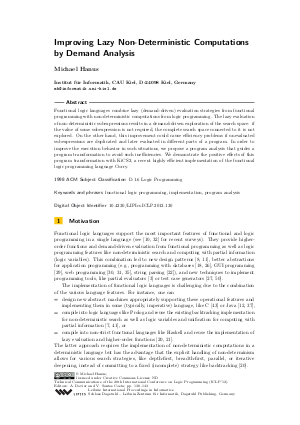Improving Lazy Non-Deterministic Computations by Demand Analysis
Author Michael Hanus
-
Part of:
Volume:
Technical Communications of the 28th International Conference on Logic Programming (ICLP'12) (ICLP 2012)
Part of: Series: Leibniz International Proceedings in Informatics (LIPIcs)
Part of: Conference: International Conference on Logic Programming (ICLP) - License:
 Creative Commons Attribution-NoDerivs 3.0 Unported license
Creative Commons Attribution-NoDerivs 3.0 Unported license
- Publication Date: 2012-09-05
File

PDF
LIPIcs.ICLP.2012.130.pdf
- Filesize: 416 kB
- 14 pages
Document Identifiers
Subject Classification
Keywords
- functional logic programming
- implementation
- program analysis
Metrics
- Access Statistics
-
Total Accesses (updated on a weekly basis)
0Document
0Metadata
Abstract
Functional logic languages combine lazy (demand-driven) evaluation strategies from functional programming with non-deterministic computations from logic programming. The lazy evaluation of non-deterministic subexpressions results in a demand-driven exploration of the search space: if the value of some subexpression is not required, the complete search space connected to it is not explored. On the other hand, this improvement could cause efficiency problems if unevaluated subexpressions are duplicated and later evaluated in different parts of a program. In order to improve the execution behavior in such situations, we propose a program analysis that guides a program transformation to avoid such inefficiencies. We demonstrate the positive effects of this program transformation with KiCS2, a recent highly efficient implementation of the functional logic programming language Curry.
Cite As Get BibTex
Michael Hanus. Improving Lazy Non-Deterministic Computations by Demand Analysis. In Technical Communications of the 28th International Conference on Logic Programming (ICLP'12). Leibniz International Proceedings in Informatics (LIPIcs), Volume 17, pp. 130-143, Schloss Dagstuhl – Leibniz-Zentrum für Informatik (2012)
https://doi.org/10.4230/LIPIcs.ICLP.2012.130
BibTex
@InProceedings{hanus:LIPIcs.ICLP.2012.130,
author = {Hanus, Michael},
title = {{Improving Lazy Non-Deterministic Computations by Demand Analysis}},
booktitle = {Technical Communications of the 28th International Conference on Logic Programming (ICLP'12)},
pages = {130--143},
series = {Leibniz International Proceedings in Informatics (LIPIcs)},
ISBN = {978-3-939897-43-9},
ISSN = {1868-8969},
year = {2012},
volume = {17},
editor = {Dovier, Agostino and Santos Costa, V{\'\i}tor},
publisher = {Schloss Dagstuhl -- Leibniz-Zentrum f{\"u}r Informatik},
address = {Dagstuhl, Germany},
URL = {https://drops.dagstuhl.de/entities/document/10.4230/LIPIcs.ICLP.2012.130},
URN = {urn:nbn:de:0030-drops-36167},
doi = {10.4230/LIPIcs.ICLP.2012.130},
annote = {Keywords: functional logic programming, implementation, program analysis}
}
